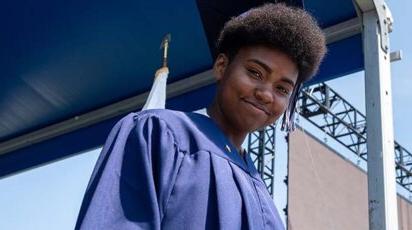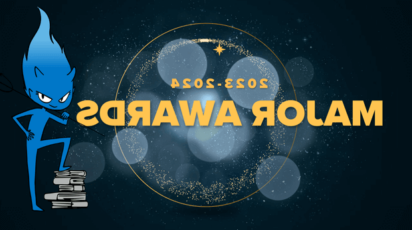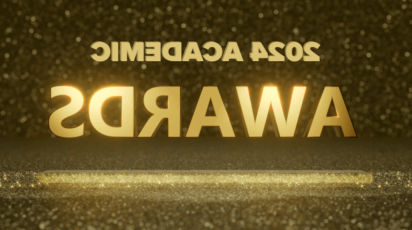News
Joseph Dana Allen Award Winners 2024
William Ling-Regan ’24 and Marisa Triola ’24 were the recipients of the prestigious Joseph Dana Allen Award, presented in honor of Dr. Joseph Dana Allen, Head of School from 1917-1948. This award recognizes the highest scholarship combined with exceptional character.
At Poly’s 167th Commencement on June 14, 2024, they delivered a speech reflecting their collective experience as the first of 37 members of the Class of 2024 who started as Nursery students at the Lower School. Their collaborative speech highlighted the unique and defining experiences of their graduating class within the larger world, the values of working together, and the intellectual growth that Poly imparted through treasured spaces and unique opportunities. They also expressed gratitude for everything that a Poly education has already made possible for them. Enjoy their insightful speech, dedicated to recognizing every impactful part of their education across fifteen years.
Marisa:
Good morning faculty, staff, trustees, family, friends, and most importantly, the Class of 2024! We are so grateful to have the privilege to speak today about how we have been shaped by Poly and by our classmates.
William and I have both been at Poly since the very beginning of our education, starting in Nursery at the Lower School in September 2009. It’s especially meaningful to us to be giving this speech together as we’ve known each other for as long as we can remember. In these past fifteen years, Poly has shaped how we’ve grown and changed (although William grew a little bit taller than I did). We’ve seen our class begin as only 37 students and become the incredibly diverse and accomplished community of 138 students that we are today.
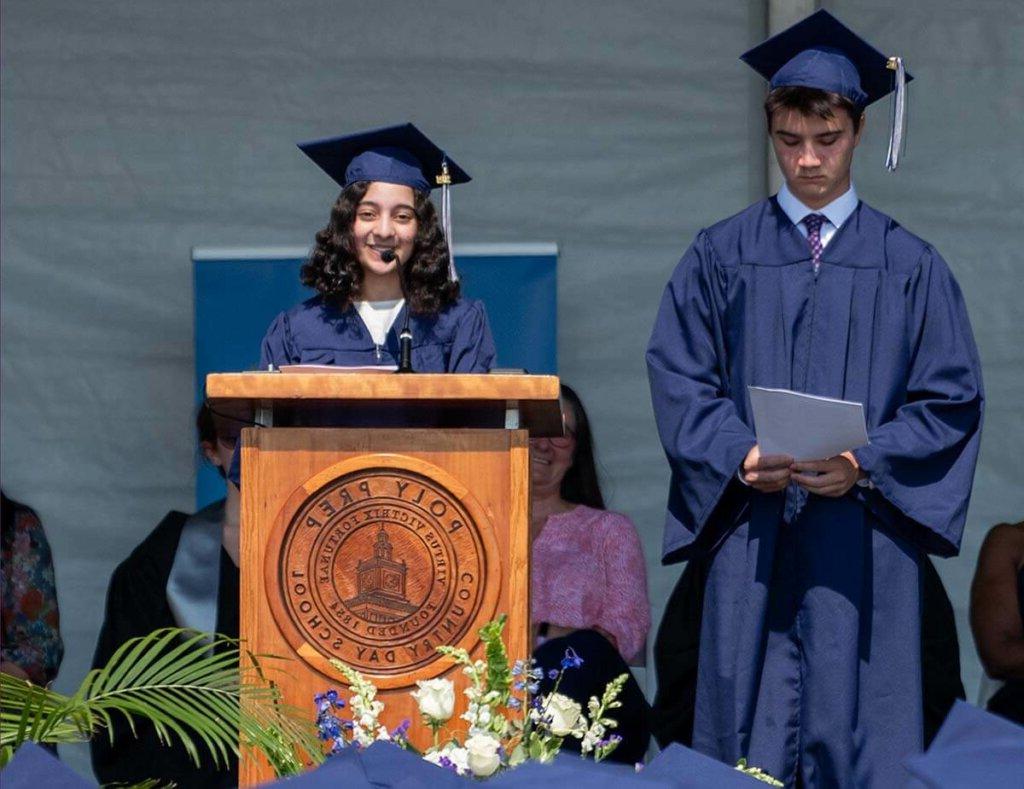
Our journey has spanned smoke from wildfires, a citywide flood, an earthquake, a solar eclipse, and a global pandemic. At this very moment, we’re only a few feet away from where we started our high school journey on Tuesday, September 8, 2020, but we’ve come so far. I still remember getting off the bus on the first day of ninth grade to see the back fields covered in white tents and blue camp chairs. In our first few months of high school, we had to adapt to learning through masks, outdoors, subject to the weather. Still, our grade has always found new ways to work together, whether it was meeting our clubs on Zoom or getting to know each other as we walked across the grass between classes. So in that spirit, we wanted to share one essential lesson we’ve learned from our time at Poly: the importance of collaboration.
William:
Since those first few months on the back fields, our class has taken advantage of every corner of Poly’s campus and every opportunity it has to offer. From championship games and club fairs out here on the back fields to art shows in the hallways to our capstone presentations in the classrooms, we’ve gotten so much from our campus, but even more from our classmates. All of these moments have been achieved through the support and teamwork of our peers.
But it’s not only our big moments of coming together that make our grade who we are, it’s the small—but never insignificant—interactions that build our community, from fighting over grapes and pineapple in the fruit salad in Commons to conversations on the way to the buses to studying together in the library (always at a respectful volume).
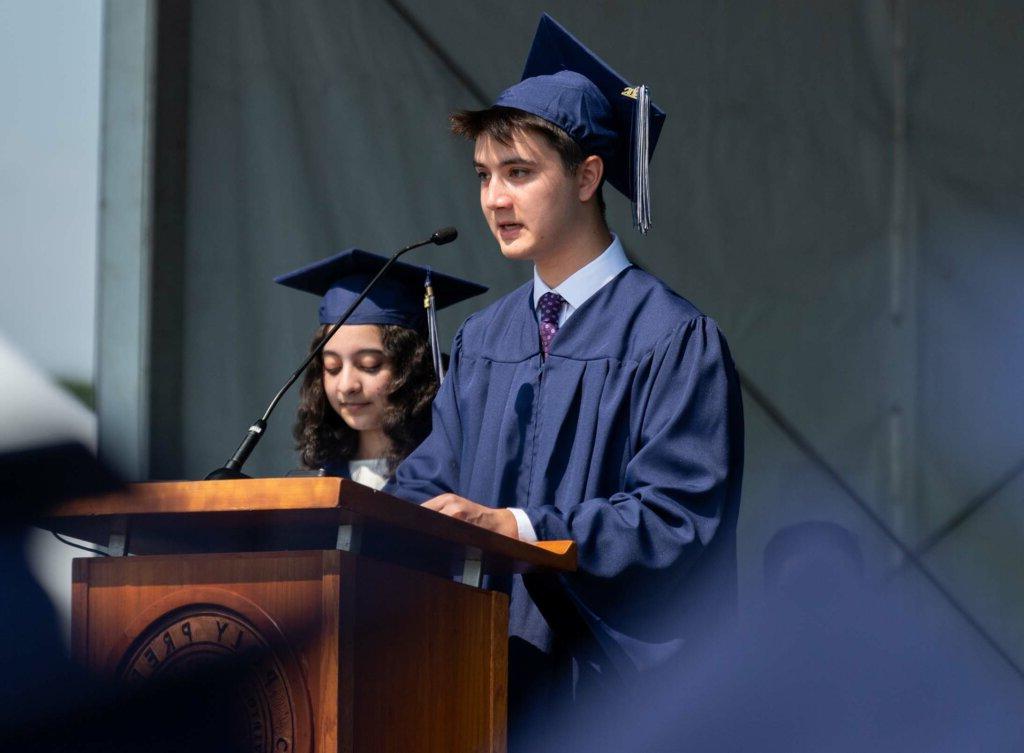
Next year, we will be scattered throughout the country and even the world. We’ll never again get to be the seniors who lead the school out of Chapel or fill up Dyker Bagels during lunch. There will be no more Blue Devil Nights in the fall or sitting in the quad in the spring. Thankfully, our parents will never get another email saying we forgot to sign in and there won’t be any more people camping outside our houses to splash us with water. All this is to say, after four years together, our distance next year will be an immense change. However, we’ll take with us all of these memories, both big and small, and the collaboration that Poly has taught us to value.
Marisa:
Poly’s first Board of Trustees envisioned a student body excelling in “all those studies and attainments that can enlarge the understanding, develop the mental action, cultivate the mind, and beautify and adorn the intellect and the heart.” I think that our class has come to embody this vision. Throughout the last four years, we discovered new interests and developed new skills both inside and outside the classroom. Each one of us has grown so much in terms of both intellect and heart, but none of us did this alone. Poly has taught us that even when we’re pursuing our own individual goals, our classmates are always there to support us.
In my senior year Electronics class with Mr. [Matthew] Futterman, our projects involved designing and building circuits. As we experimented with electronic components and circuit designs that were new to us, we ran into many roadblocks. But this class reminded me of the importance of working with my classmates. I found that staring at my own malfunctioning circuit was never as effective as listening to my peers, who were in similar situations but had different approaches. I learned that even if I could think of only one solution, there are always more.
I’ve also found collaboration to be most important in History Club. With the guidance of Dr. [Virginia] Dillon, our club has competed in the National History Day competition with projects on topics ranging from women in cryptanalysis during World War II, to activist and photographer Corky Lee. Whether I was researching and creating a project individually or in a group, so much of what was achieved in History Club and the competition can be attributed to our collaboration. By reading each other’s work, talking through ideas, mentoring younger club members, or simply sharing snacks, we not only created successful projects but also created our own small community.
William:
In my English class with Mr. [Sean] Mullin, we studied fiercely individualistic figures from American literature: from Henry David Thoreau, who went to live alone in the woods, to Jay Gatsby, who created a new identity for himself, to Sula Peace, who refused to live her life on anyone else’s terms. From these singular individuals, I learned the importance of independence and self-identification, but somewhat paradoxically, I also learned just how important other people are to our development. My classmates and I would come to class every day excited to share our ideas, and in discussions that lasted the entire period, we would build upon one another’s comments, often disagreeing, but always furthering our understanding of these books by discussing with one another.
I experienced a different kind of collaboration while working on The Polygon. While there might only be one name on the byline, every article is the product of hours of cooperation between the writer, the interview subjects, the section, photography, copy and layout editors, and Ms. [Rachael] Allen. Together, all of these people transform an idea shouted out at a hectic pitch meeting into the articles we publish every month. The combination of all of their different skills and ideas ensures that we are sharing the most accurate and interesting stories possible.
Marisa:
In our time at Poly, collaboration has been essential to every one of the many endeavors our class has taken part in and led. With every music performance, sports practice, theater production, service learning project, and affinity group meeting, we learn so much from one another and in the process, become more open, educated, and kind.
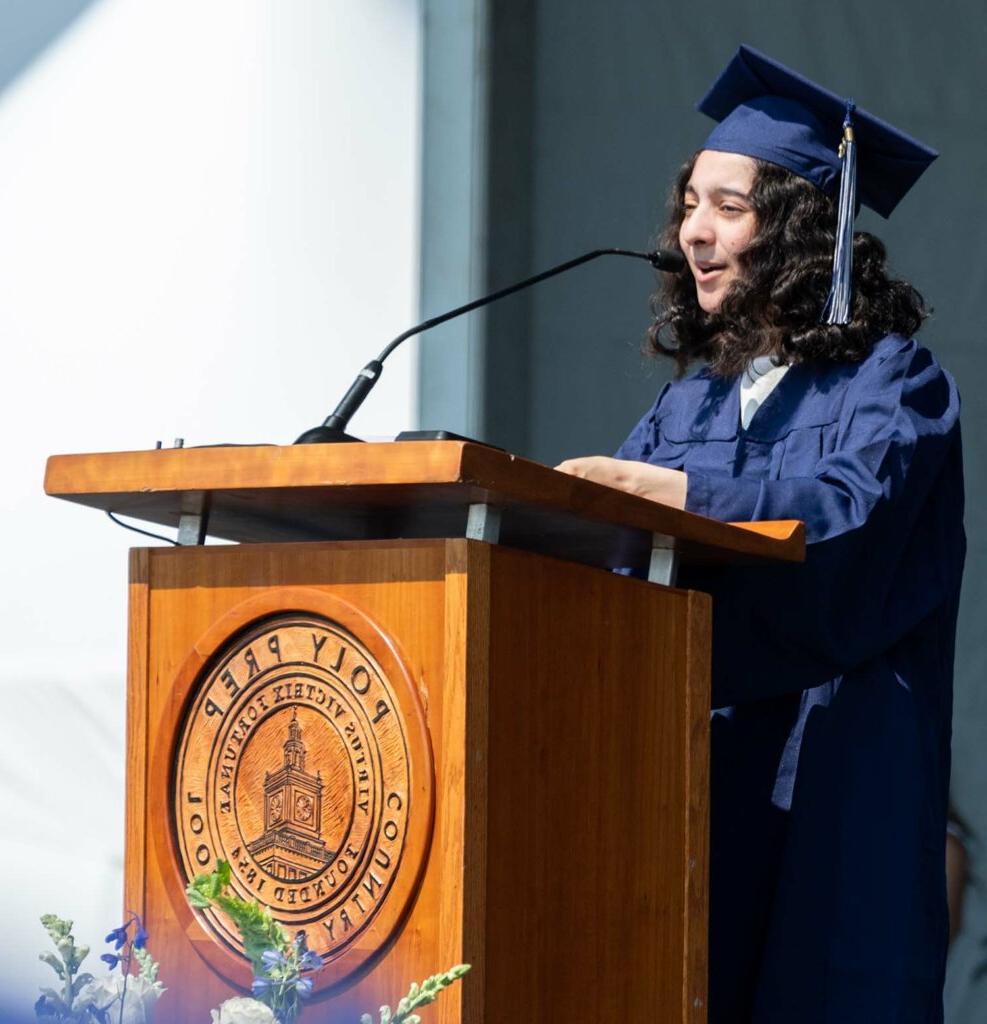
Still, collaboration was never just between our classmates, it was with every member of the community. Thank you to our teachers for fostering our academic and extracurricular growth. Your passion and genuine care continues to inspire us. Thank you to our deans and administrators for always looking out for us and keeping your doors open. Thank you to the staff for your sometimes unseen but never unappreciated work. Thank you to the trustees for your stewardship. And thank you to our families for your unconditional love and support.
We are so grateful for everything we have learned from all of you and everything you have made possible for us in our futures.
William:
Lastly, thank you to all of our friends and classmates. Thank you for always showing up and supporting: on a Friday night, you’ll fill up the bleachers, Chapel, or the theater to cheer on your friends at every game and performance, and on a Saturday morning, you’ll come to school and pack up food for community fridges. Thank you for sharing your perspectives in discussions, and in long talks over the phone or on laps around the hallways. Thank you for dancing in the library on the last day of classes. Thank you for challenging us, making us laugh, and making us better people.
In both my Latin and Philosophy classes with Mr. [Kent] Leeklymenko, he would always say, “Omnia disce. Videbis postea, nihil est superfluum.” Translated, this says, “Learn everything. Later you will see, nothing is superfluous.” As we leave behind the heights called Dyker, I hope we keep these words in mind. I hope we continue the multifaceted education we’ve begun at Poly in college and learn about everything, from the fields we are already experts in to the unexpected passions we discover along the way. Beyond learning itself, I hope we continue to build relationships and collaborate with our future classmates wherever possible to form communities like this one. No matter what your dreams for the future are, these communities will be essential to making them happen. At the same time as we look to the future, I hope we continue the connections we’ve made here. This moment may feel like an ending, but I believe it is only the beginning of a lifetime of working together. So remember that this class, this school, and these friendships will always be here for us. Later we will see, no collaboration is ever superfluous.
Thank you.

